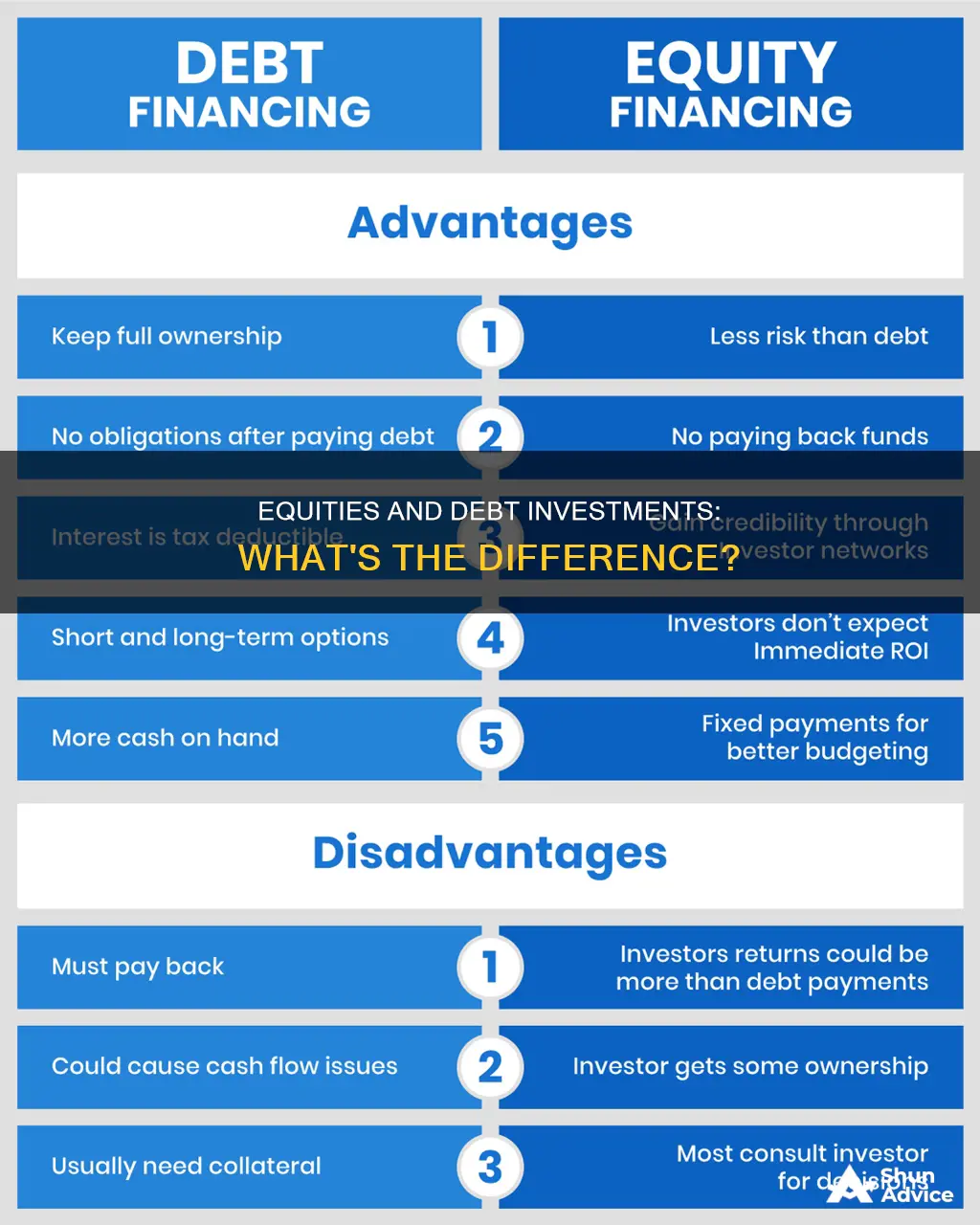
Debt and equity are two broad categories of investments. Debt investments are loans that yield interest payments to their owners. Equity investments, on the other hand, represent ownership of a company. This fundamental difference means that debt investments are generally considered less risky than equity investments, which are subject to greater fluctuations in value. Equity investments, however, have a greater potential for significant gains.
What You'll Learn
- Debt investments are less risky but offer lower returns than equities
- Debt investments are loans, while equities are ownership in a company
- Debt investments pay interest, while equities provide dividends or capital gains
- Debt investments are less prone to market fluctuations
- Debt investments can be secured through a bank, while equities are often independent investors

Debt investments are less risky but offer lower returns than equities
Debt investments and equity investments are two distinct parts of the financial world. Debt investments are generally considered less risky than equity investments but offer lower returns.
Debt investments refer to loans or bonds, where investors lend money to a borrower, often a company or the government, in exchange for regular interest payments. The borrower repays the principal amount at maturity. Debt instruments are less prone to market fluctuations and offer fixed returns. In the event of liquidation, debt investors are prioritised for repayment. Examples of debt investments include corporate and government bonds, certificates of deposit, annuities, and municipal bonds.
On the other hand, equity investments represent ownership in a company. Investors profit from dividends, which are percentages of company profits, or the resale of stocks if the market price increases. Equity investments are riskier than debt investments as they are subject to market volatility and there is a chance of losing the entire investment in the event of bankruptcy. However, equity investments offer the potential for higher returns. Examples of equity investments include stocks, mutual funds, and real estate.
When deciding between debt and equity investments, it is important to consider risk tolerance and financial goals. Debt investments are generally more suitable for those with a lower risk appetite, while equity investments may be more attractive to those seeking higher returns. Diversifying an investment portfolio with a mix of debt and equity investments can be a prudent strategy.
HNIs' Investment Strategies in India: Where Do They Invest?
You may want to see also

Debt investments are loans, while equities are ownership in a company
Debt investments are loans made by investors to companies or governments, while equities are ownership stakes in a company.
Debt Investments
Debt investments are loans made by investors to companies or governments, while equities are ownership stakes in a company. They are called "debt" investments because the company or government that receives the money owes a debt to the investor. This debt is represented by a bond, which is a promise to repay the investor with interest. Bonds are the most common form of debt investment.
Debt investments are considered to be less risky than equity investments. This is because they offer fixed returns and have a higher claim on assets during liquidation. Even if a company goes bankrupt, debt investors will be paid back first. However, debt investments typically offer lower returns than equity investments.
Equity Investments
Equity investments, on the other hand, are ownership stakes in a company. When someone buys equity in a company, they become a shareholder and have a claim on a percentage of the company's earnings and assets. Equity investors can profit from dividends, which are the percentage of company profits returned to shareholders. They can also profit from the sale of their stock if the market price increases.
Equities are considered riskier than debt investments because they are subject to market fluctuations and there is no guarantee of dividends or capital gains. However, they have the potential to deliver higher returns than debt investments.
Key Differences
To summarise, debt investments are loans, while equities are ownership stakes. Debt investments generally pay interest, while equities provide dividends or capital gains. Debt instruments are often considered less risky, whereas equities are seen as riskier but potentially more rewarding.
Diversification: Managing Risk in Your Investment Portfolio
You may want to see also

Debt investments pay interest, while equities provide dividends or capital gains
Debt investments and equity investments are two distinct categories of investments. Debt investments are generally considered loans, while equity investments represent ownership in a company.
Debt investments pay interest to investors, while equities provide dividends or capital gains. Debt instruments are loans that yield interest payments to their owners. The interest rate may be fixed or variable. In the case of fixed-rate investments, the investor knows exactly how much their financing will cost and how much they will earn in interest. However, the value of a fixed-rate investment can change over time. This is because the real yield or net profit that a buyer receives can fluctuate with the constant changes in the going interest offered by newly issued bonds.
On the other hand, equities, such as stocks, are shares of ownership in a company. The owner of an equity stake may profit from dividends, which are percentages of company profits returned to shareholders. They may also profit from capital gains, which are increases in the market price of the stock. Dividends are discretionary, meaning the company is not legally obligated to issue them. Therefore, the amount of dividends received by shareholders cannot be predicted or controlled.
Equities are riskier than debt investments but have a greater potential for significant gains. Debt investments, on the other hand, generally carry less risk and offer lower potential returns. They also fluctuate less in price than stocks. In the event of a company liquidation, debt investors will be paid before equity investors.
Maximizing Your Savings Account: A Guide to Smart Investing
You may want to see also

Debt investments are less prone to market fluctuations
Debt investments are generally considered less prone to market fluctuations than equity investments. This is because debt investments are loans that yield fixed interest payments to their owners, whereas equity investments are stakes in a company that are bought to profit from company dividends or the resale of the stock.
Debt investments, such as bonds, are considered a safer option than equities as they offer fixed returns and have a higher claim on assets during liquidation. The price of a bond may fluctuate, but this is mainly due to the changing interest rates offered by newly issued bonds. The interest rate of a bond is usually fixed, meaning that the return on investment is stable and predictable.
Equities, on the other hand, are inherently riskier and have a greater potential for significant gains or losses. Shares of equity can experience substantial price swings, which may have little to do with the stability or finances of the company. These fluctuations can be caused by social, political, governmental, or economic events.
Debt investments are also less prone to market fluctuations because, even if a company goes bankrupt, debt investors will be the first to be paid back. In contrast, equity investors may lose their entire stake in the company in the event of bankruptcy.
Overall, debt investments are less prone to market fluctuations than equity investments due to their fixed returns, higher claim on assets, and priority in repayment.
Equity-Linked Investments: Understanding the Risks and Rewards
You may want to see also

Debt investments can be secured through a bank, while equities are often independent investors
Debt investments and equity investments are two distinct categories of investments. Debt investments are essentially loans that yield interest payments to their owners. On the other hand, equity investments represent ownership in a company, and investors profit from dividends or the resale of stocks.
Debt investments can be secured through a bank, which is a traditional lender. This is known as debt financing. The benefits of debt financing include quick access to funds, fixed financing costs, and full retention of business ownership. However, the downside is that the borrowed amount, along with interest, needs to be repaid, which can strain cash flow.
Equity financing, on the other hand, involves securing capital in exchange for a percentage of ownership in the business. While this option does not require debt repayment, investors forgo a percentage of future earnings. Giving up part of a potentially profitable business can be a costly long-term decision.
Equity investments are often sourced from independent investors rather than banks. These investors become shareholders in the business and may have a voice in decision-making, which can be a drawback for business owners who want to retain full control.
The decision between debt and equity financing depends on various factors, including the economic climate, the business's capital structure, and its life cycle stage. Debt financing is generally quicker to obtain, while equity financing may involve negotiations to determine the percentage of the business exchanged for the investment.
Store Managers: Understaffed and Under Pressure
You may want to see also
Frequently asked questions
Debt investments are loans made to companies or governments, usually in the form of bonds. The investor lends money to the borrower and receives regular interest payments over a specified term. At the end of the term, the borrower repays the original amount (principal).
Debt investments are generally considered lower risk than equities. They provide stable and predictable returns, and investors will be paid first in the event of bankruptcy. However, they offer lower returns than equities and are subject to the risks of inflation and interest rate changes.
Equities, or stocks, represent ownership in a company. Investors buy shares of stock, giving them a claim on a percentage of the company's earnings and assets. Equities offer the potential for higher returns than debt investments but carry more risk. Investors can lose their entire stake in the event of bankruptcy.
The decision to invest in debt or equities depends on your risk tolerance, investment goals, and the economic climate. Debt investments are generally lower risk and provide stable returns, while equities offer higher potential returns but with greater risk. Consult a financial advisor to determine which type of investment aligns with your goals and risk profile.







